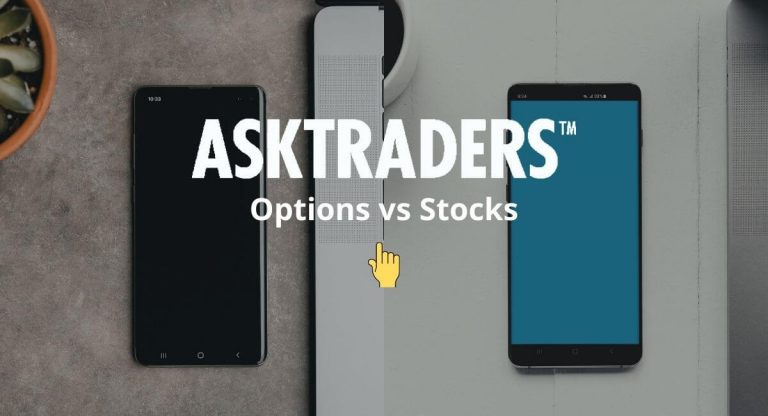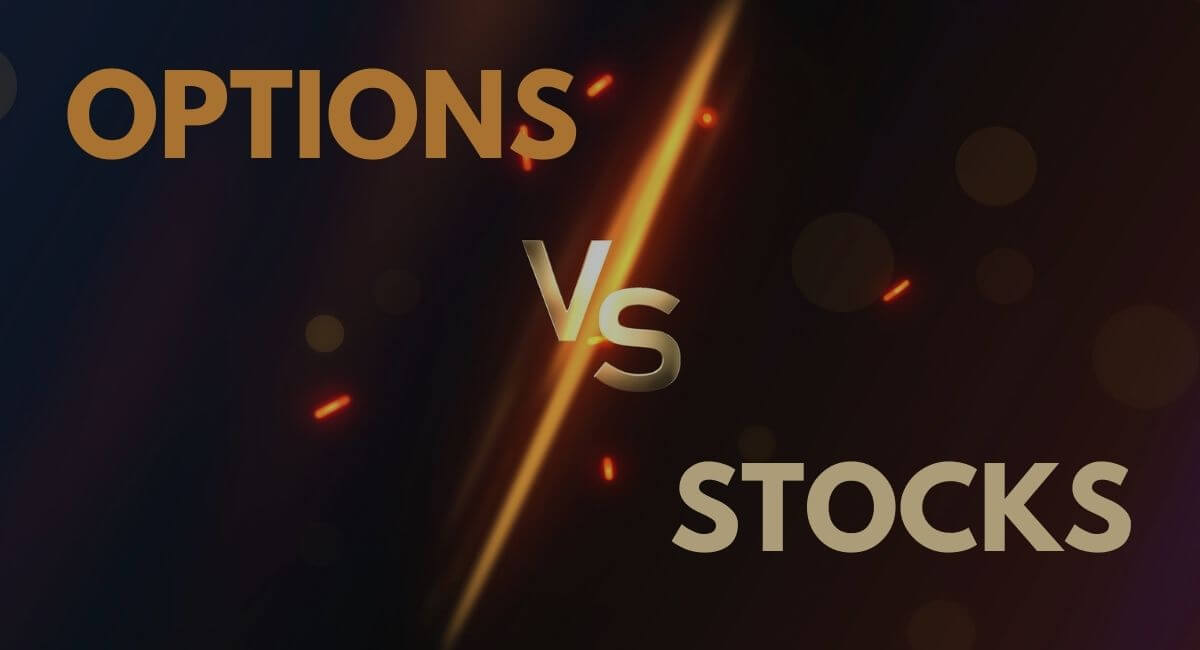
Although these two securities are traded in the same manner, there are differences between them. Before we get into the differences between these securities, let's look at what these instruments are. In this article, we will explain the distinction between options vs stocks, as well as the benefits and drawbacks of each.
What are the Differences Between Options Vs Stocks?
Stocks
A stock is a type of financial instrument, which indicates ownership in a business, and also signifies a claim on the assets and profits of the business. These investments form the basis of almost every portfolio, and are considered reliable long-term securities.
Options
Options, on the other hand, are derivatives. Derivatives are a type of security that derive their value from an underlying asset, such as a currency, stock, precious metal or commodity. Options give the buyer the right, and not the obligation, to sell (through an option) or buy (through a call option) an asset or financial security at a specified price, also known as the strike price, over a specified period of time. It is used to hedge market risk associated with asset prices.
Let us look at the comparison table for options vs stocks as below.
| Comparison | Stocks Trading | Options Trading |
| Ownership | Share purchases represent the ownership of the company. | A stock option represents an option to buy or sell (depending on the type of option) a stock. |
| Dividend/Voting Rights | Shareholders get the right to vote in important matters of the company and the share of dividends (if any) paid by the company. | Holders of stock options do not receive dividends nor do they enjoy voting rights. |
| Expiration | The company’s stock will expire until the company exists. In this aspect, stocks are assets. | The option expires on a future date called the expiration date, after which the investor no longer has the option to buy or sell. In this aspect, the option is an expense if the expiration of the occurrence of money (loss). |
| Valuation | Stock prices are based primarily on market strength, company fundamentals such as company earnings survey, product success, etc. | The stock option price is based to a large extent on the underlying stock price, time to expiration, and other factors. |
| Trading/Investment | Stocks are investment instruments that can be sold to other investors at any time. | Option is a trading instrument and cannot be traded after the expiration date. |
| Risk | The possibility of losing the entire principal invested, and sometimes more. | As an option holder, you risk the entire amount of premium you pay. But as a writer of choice, you have a much higher risk. For example, if you write an undisclosed call, you face the possibility of unlimited losses, as there is no limit to how high a stock price can go up. |
Option Trading Vs Stock Trading

Leverage Profits
Option holders can take advantage of leverage gains, for example, if the stock price increases by 1 percent, the option price can be expected to increase by up to 10 percent, which is 10 times higher than the stock price.
Income Gains from Downside
To profit from a stock price decline, traders can shorten these financial instruments, which usually result in unlimited losses and margins if the stock price rises further. You can only short a stock with a trading margin that allows trading.
On the other hand, when you trade options, you can profit even from a drop in the price of the underlying security by buying a set option. The value of putting an option increases as the value of the underlying security decreases, so option holders can take advantage of price declines as well. When you buy an option, you do not have to pay any margin, and the loss is limited to the option price that has been paid to buy this security.
Time Limit
The option has a specific time frame, and it can only be held by the option holder until the time expires. Whereas, in case of a stock, if you take a long or short position, you can keep it for an indefinite period of time.
Price Movement
With stock price variations, option prices also vary, but variations in option value are relatively low. The extent to which the option price variation corresponds to the stock price variation can be measured by the strike price defined in the option contract.
Options vs Stocks: How To Choose
- Find Out Your Investment Objective
Before embarking on an investment journey, it is critical for investors to take a step back and determine the investment objective. Are you looking for a hedge position or are you trying to generate income from the underlying asset? Investors are ready for the next step once they have figured this out.
- Determine Risk/Reward
The next step is for investors to assess the risk and reward of an underlying asset and decide whether to buy or sell a stock or an option based on their risk tolerance. It is important to note that each option has a different risk and reward profile, so conduct thorough research beforehand.
- Determine Volatility
Volatility of an underlying asset has a large impact on market price, especially for options, so be sure to research market volatility before deciding on your stocks and options strategies.
- Formulate a Strategy
After you have completed all of the above-mentioned analyses, it is time to devise the best strategy before embarking on your investment journey. For example, if you are an aggressive investor with a high risk tolerance, you may want to buy or sell major stocks, and vice versa.
Advantages of Investing in Stocks

If you're thinking about investing in the stock market, common stocks are a good place to start. When you own common stock, you own a larger portion of the company. This is a good way for young investors to get a bigger piece of the action.
However, common stock, like any other investment, has advantages and disadvantages. While common stocks offer limited liability and high income potential, they are also the last to be paid if the company is liquidated, making it difficult to manage your investments.
1. Investment With Limited Liability
One of the main advantages of stocks is that they allow you to invest in a business with only limited liability. This is because your liability is limited to the amount of your investment. So, if you invest $ 1,000 in a company, for example, that’s the most you can lose. This is good news if your investment goes bad and the business ends because creditors have a lot of money.
2. High Income Potential
Common stock has the advantage of offering high earning potential. Compared to bonds or certificates of deposit, they provide a better chance of making a greater return on investment. Other investments are guaranteed, so you know the minimum and maximum amounts you can get from them.
However, common stock has no limit. While this means that you may lose money, it also means that there is no limit to how much you can earn.
3. High Liquidity
Investors can not only buy and sell stocks on the stock market easily, but they can also convert the acquired shares to cash quickly and with little to no transaction cost. One of the many significant advantages of investing in stocks is its high liquidity.
Disadvantages of Investing in Stocks
1. Last to Get Paid
An important disadvantage of common stock is that if the company is dissolved, you probably won’t see a dime. This is because common shareholders are the last in the pecking order. Bondholders, other debtholders and preferred shareholders must be paid what they pay before the money will be distributed to ordinary shareholders. If there is nothing left, then you are out of luck.
2. Lack of Control
A common stock loss is that it can be difficult or impossible to control your investments. If you invest in your own business, you can make decisions about your business strategies and practices. When you invest in common stock, you are subject to the wishes of other shareholders. The only way to gain control is to get a majority share in the investment – an expensive proposition for most companies.
3. Risk
When done correctly, stock investing has a high return potential. However, it is also known to carry the risk of causing you to lose your entire investment capital. When it comes to investing, the risks of losing money are always present due to the rise and fall of stock prices as a result of a company's performance.
Advantages of Investing in Options

Options investing has received a lot of attention recently, as many people have realised the benefits it has to offer. Let us go over the benefits and drawbacks of options investing.
1. Low Risk
Options trading is widely regarded as a high-risk investment. However, there are some circumstances in which options can be used to reduce risk during your investment. This is due to the fact that, unlike buying and selling stocks, options trading requires less financial commitment and is one of the most dependable forms of hedge trading.
2. Cost-Efficient
With the high leveraging power of options, investors can end up saving a lot of money because they can sometimes obtain a position that is similar to buying and selling a stock. However, in order to mimic the stock's position, this cost-cutting strategy necessitates investors determining the exact right call to buy or sell.
3. High Potential Returns
Options, which can sometimes provide investors with a lower spending cost if the right strategy is used, allow them to be rewarded with high potential returns.
Disadvantages of Trading in Options
1. Low Liquidity
Despite their high potential returns, options are known to have significantly lower liquidity than stocks. Options may have a much lower trading volume due to their different expiration dates and prices, resulting in lower liquidity.
2. Higher Spreads
Due to the fact that low volume equals low liquidity in options, this may eventually lead to higher spreads for the instrument while trading. Higher trading spreads mean that investors may incur a slew of indirect costs, resulting in higher total spending.
3. Fluctuations
Because options are leveraged instruments, the market price will eventually swing up and down, making them unsuitable for investors who are not prepared to trade in high-volatility instruments.
Conclusion
Stock purchases are traditional investment products in which investors invest in a company's stock and expect dividends and capital gains.
Options, on the other hand, are modern derivative products in which the trader gains or loses based on future movements in the value of the stock price by paying a small premium to the author of the option rather than investing an amount equal to the stock's value.
As a result, there is no clear winner in the comparison of options vs stocks; both are important portfolio tools for investors in situations where stocks are good for long-term investment purposes, and the best option is one that enjoys flexibility while reducing risk through hedging.




